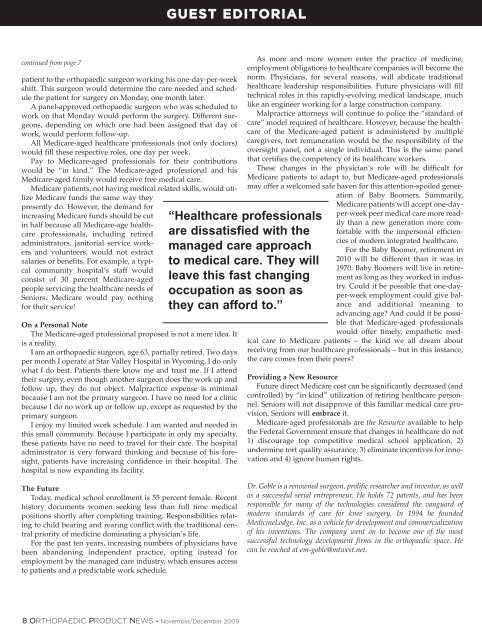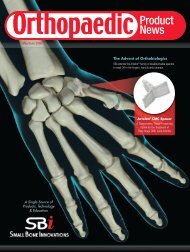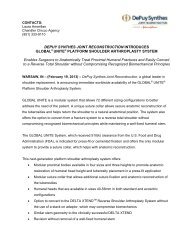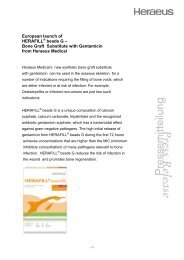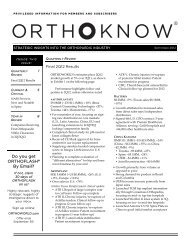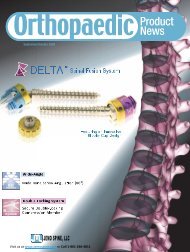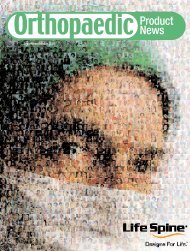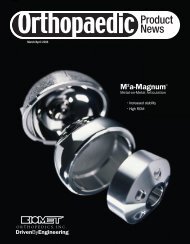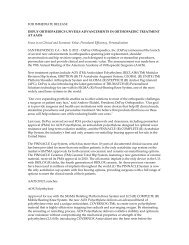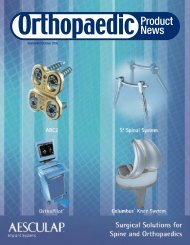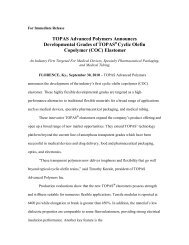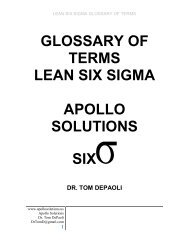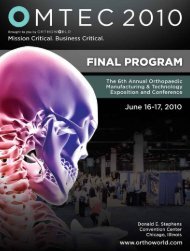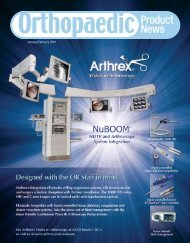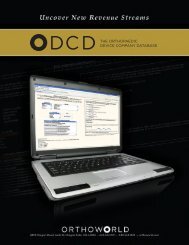Hip & Knee Surgery - Orthoworld
Hip & Knee Surgery - Orthoworld
Hip & Knee Surgery - Orthoworld
Create successful ePaper yourself
Turn your PDF publications into a flip-book with our unique Google optimized e-Paper software.
GUEST EDITORIALcontinued from page 7patient to the orthopaedic surgeon working his one-day-per-weekshift. This surgeon would determine the care needed and schedulethe patient for surgery on Monday, one month later.A panel-approved orthopaedic surgeon who was scheduled towork on that Monday would perform the surgery. Different surgeons,depending on which one had been assigned that day ofwork, would perform follow-up.All Medicare-aged healthcare professionals (not only doctors)would fill these respective roles, one day per week.Pay to Medicare-aged professionals for their contributionswould be “in kind.” The Medicare-aged professional and hisMedicare-aged family would receive free medical care.Medicare patients, not having medical related skills, would utilizeMedicare funds the same way theypresently do. However, the demand forincreasing Medicare funds should be cutin half because all Medicare-age healthcareprofessionals, including retiredadministrators, janitorial service workersand volunteers, would not extractsalaries or benefits. For example, a typicalcommunity hospital’s staff wouldconsist of 30 percent Medicare-agedpeople servicing the healthcare needs ofSeniors. Medicare would pay nothingfor their service!On a Personal NoteThe Medicare-aged professional proposed is not a mere idea. Itis a reality.I am an orthopaedic surgeon, age 63, partially retired. Two daysper month I operate at Star Valley Hospital in Wyoming. I do onlywhat I do best. Patients there know me and trust me. If I attendtheir surgery, even though another surgeon does the work up andfollow up, they do not object. Malpractice expense is minimalbecause I am not the primary surgeon. I have no need for a clinicbecause I do no work up or follow up, except as requested by theprimary surgeon.I enjoy my limited work schedule. I am wanted and needed inthis small community. Because I participate in only my specialty,these patients have no need to travel for their care. The hospitaladministrator is very forward thinking and because of his foresight,patients have increasing confidence in their hospital. Thehospital is now expanding its facility.“Healthcare professionalsare dissatisfied with themanaged care approachto medical care. They willleave this fast changingoccupation as soon asthey can afford to.”As more and more women enter the practice of medicine,employment obligations to healthcare companies will become thenorm. Physicians, for several reasons, will abdicate traditionalhealthcare leadership responsibilities. Future physicians will filltechnical roles in this rapidly-evolving medical landscape, muchlike an engineer working for a large construction company.Malpractice attorneys will continue to police the “standard ofcare” model required of healthcare. However, because the healthcareof the Medicare-aged patient is administered by multiplecaregivers, tort remuneration would be the responsibility of theoversight panel, not a single individual. This is the same panelthat certifies the competency of its healthcare workers.These changes in the physician’s role will be difficult forMedicare patients to adapt to, but Medicare-aged professionalsmay offer a welcomed safe haven for this attention-spoiled generationof Baby Boomers. Summarily,Medicare patients will accept one-dayper-weekpeer medical care more readilythan a new generation more comfortablewith the impersonal efficienciesof modern integrated healthcare.For the Baby Boomer, retirement in2010 will be different than it was in1970. Baby Boomers will live in retirementas long as they worked in industry.Could it be possible that one-dayper-weekemployment could give balanceand additional meaning toadvancing age? And could it be possiblethat Medicare-aged professionalswould offer timely, empathetic medicalcare to Medicare patients – the kind we all dream aboutreceiving from our healthcare professionals – but in this instance,the care comes from their peers?Providing a New ResourceFuture direct Medicare cost can be significantly decreased (andcontrolled) by “in kind” utilization of retiring healthcare personnel.Seniors will not disapprove of this familiar medical care provision.Seniors will embrace it.Medicare-aged professionals are the Resource available to helpthe Federal Government ensure that changes in healthcare do not1) discourage top competitive medical school application, 2)undermine tort quality assurance, 3) eliminate incentives for innovationand 4) ignore human rights.The FutureToday, medical school enrollment is 55 percent female. Recenthistory documents women seeking less than full time medicalpositions shortly after completing training. Responsibilities relatingto child bearing and rearing conflict with the traditional centralpriority of medicine dominating a physician’s life.For the past ten years, increasing numbers of physicians havebeen abandoning independent practice, opting instead foremployment by the managed care industry, which ensures accessto patients and a predictable work schedule.Dr. Goble is a renowned surgeon, prolific researcher and inventor, as wellas a successful serial entrepreneur. He holds 72 patents, and has beenresponsible for many of the technologies considered the vanguard ofmodern standards of care for knee surgery. In 1994 he foundedMedicineLodge, Inc. as a vehicle for development and commercializationof his inventions. The company went on to become one of the mostsuccessful technology development firms in the orthopaedic space. Hecan be reached at em-goble@mtwest.net.8 ORTHOPAEDIC PRODUCT NEWS • November/December 2009


